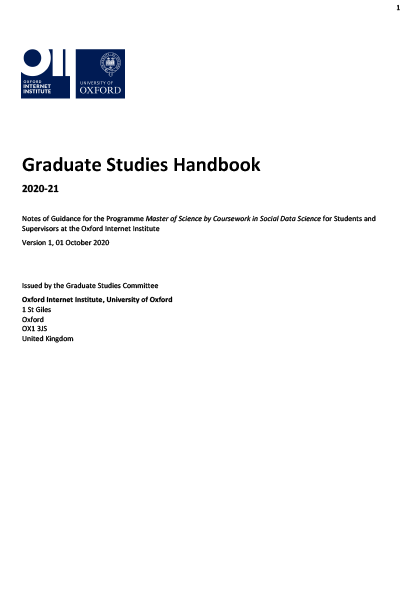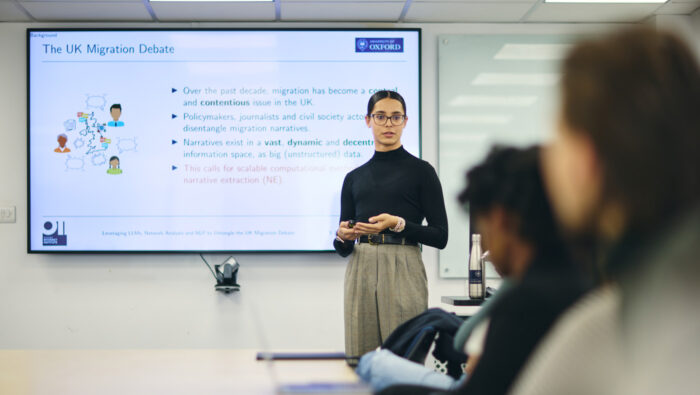Start date: October 2026
Duration: 10 months (full-time) or 22 months (part-time)
Location: Oxford
Deadlines: Friday 14 November 2025 and Friday 9 January 2026

Start date: October 2026
Duration: 10 months (full-time) or 22 months (part-time)
Location: Oxford
Deadlines: Friday 14 November 2025 and Friday 9 January 2026

Explore the implications of digital technologies for how we live, work and govern with the MSc in Social Science of the Internet.
Delivered by the Oxford Internet Institute’s world-leading multidisciplinary faculty, this intellectually rigorous and practically relevant programme equips students with the theoretical frameworks, methodological tools, and technical understanding needed to critically examine the Internet’s impact on everyday life, democracies, economies and societies.
Whether your goal is doctoral study, a career in tech policy, leadership in public policy, or tech innovation, this programme offers a unique opportunity to engage with cutting-edge research and real-world applications in a dynamic academic environment.





The MSc combines core training in social science theory and research methods with specialist options and a thesis project.
Students select three option papers: one substantive option, one methods option, and one additional from either category.
Please note that not all options run every year.
An independent research project of up to 12,000 words, supported by seminars and supervision, allows students to apply their learning to a topic of their choice.
The MSc in Social Science of the Internet degree is highly multi-disciplinary, which is reflected in the wide range of topics addressed in final theses.
The MSc in Social Science of the Internet degree has a highly multi-disciplinary focus, which is reflected in the wide range of topics addressed in final theses.
2024
2023
2022
The MSc programme runs from October to August. Oxford University terms are referred to as Michaelmas term, Hilary term, and Trinity term and each last eight weeks.
| Michaelmas Term: Core Papers | Hilary Term: Option Papers | Trinity Term: Thesis |
|---|---|---|
|
|
|
The course content for the part-time degree is spread over two years. Part-time students spend one to two days a week in Oxford during term-time, attending all lectures and seminars in person.
Year 1
| Michaelmas Term: Core Papers | Hilary Term: Option Papers | Trinity Term: Thesis |
|---|---|---|
|
|
|
Year 2
| Michaelmas Term: Core Papers | Hilary Term: Option Papers | Trinity Term: Thesis |
|---|---|---|
|
|
|
The Oxford Internet Institute is located in the newly opened Schwarzman Centre. Students benefit from:

Our students come from a wide range of disciplines, backgrounds, and perspectives. We believe that meaningful insight into digital society depends on a diversity of thought and lived experiences.
My course mates, with their diverse backgrounds spanning the social sciences, law, and history, brought valuable perspectives I wouldn’t have encountered otherwise.
Manpreet Deol
former MSc student

This course taught me to think rigorously about complex questions related to the impact of AI on society, drawing on insights from both computer science and the social sciences.
Lofred Madzou
former MSc student

Hear from our students in their own voices what it’s like to study at the OII:






Graduates of the MSc in Social Science of the Internet go on to careers in:
The programme’s strong emphasis on critical thinking, methodological rigour, and policy relevance prepares students for impactful roles in a rapidly evolving digital landscape.
Highlighting the achievements of some of our graduates
Applications are submitted via the University of Oxford Graduate Admissions portal. Applications must be complete by the deadline, including references.
Applicants interested in continuing on to doctoral study should include an ESRC Grand Union DTP application for 1+3 funding as part of their MSc application.
Details on tuition fees, living costs, and funding opportunities are available on the University’s Fees and Funding page.
Scholarships include:
One of Oxford’s most prestigious funding schemes, Clarendon offers around 170 fully funded scholarships annually to exceptional graduate applicants. Covering tuition and living expenses, the scholarship also provides access to a vibrant academic and professional network. The Oxford Internet Institute nominates candidates during the admissions process. Further details of this scholarship can be found on the University’s Clarendon Scholarships page.
This studentship supports MSc applicants intending to continue on to doctoral research at the OII.
The Economic and Social Research Council (ESRC) is the UK’s largest organisation for funding research on social and economic issues. Oxford, in collaboration with Brunel University and the Open University, hosts the ESRC Grand Union Doctoral Training Partnership.
The funding is available via two routes: 1+3 (MSc to DPhil) and +3 (DPhil only), for both full-time and part-time students. Applicants must submit a Grand Union DTP application alongside their graduate application. Please ensure you have read all of the guidance available on the Grand Union DTP website before completing the Grand Union DTP Application Form. Questions can be directed to the Grand Union DTP Office.
The OII welcomes a number of Rhodes and Marshall Scholars onto the MSc programme every year. Eligible students should apply for these scholarships before applying for a place on the MSc programme.
Academic Futures Scholarships
Oxford offers several targeted scholarships to support underrepresented groups:
Find out more about Academic Futures
The Weidenfeld-Hoffmann Scholarships and Leadership Programme combines graduate study with leadership development, mentoring, and networking. To be considered for this scheme, applicants must select the Weidenfeld-Hoffmann Scholarships and Leadership Programme in the University of Oxford Scholarships section of the University’s graduate application form.
The OII awards a limited number of MSc Scholarships supported by the Shirley Scholars Fund which was established in honour of OII founder donor Dame Stephanie Shirley. These departmental scholarships are open to all MSc applicants.
Download the handbook for study in the academic year 2025-2026

The MSc in Social Science of the Internet focuses on the societal impact of digital technologies, using a mix of qualitative, quantitative, and computational methods. The MSc in Social Data Science is geared towards students with strong quantitative skills who want to apply advanced techniques like machine learning to analyse human behaviour and social phenomena.
There are two deadlines for both full-time and part-time programmes. Applications in both deadlines are given equal consideration; the main difference is that applicants applying in November receive an earlier decision. Start early to ensure your application, including references, is complete by your chosen deadline. Apply via the University of Oxford Graduate Admissions site, find a guide to getting started here.
If you already have English language test scores at the required level achieved within two years of the start of the course to which you are applying, please include them in your application. However, you are not required to provide test scores when you submit your application. If you receive an offer of a place, you will be required to submit language test scores by a specific deadline as a condition of your offer. See the application guide for details.
You will be assigned a general supervisor in your first term. In the second term, based on your research interests, you’ll be matched with a thesis supervisor. The department provides resources such as topic booklets and faculty introductions to support this process.
Course fees cover tuition and academic services and facilities, but not accommodation or living costs. Oxford combines tuition and college fees into a single figure. See the University’s fee guidance and living cost estimates for budgeting.
Full-time students must reside in Oxford during the eight-week terms (Michaelmas, Hilary, Trinity) and be present for exams in 0th week of Hilary Term. Part-time students need not live in the city but must travel to Oxford weekly during term-time.
Part-time students attend in person at least one day per week during Michaelmas and Trinity terms. Hilary Term attendance varies by option choices. You’ll also need to dedicate one additional day per week to independent study. Attendance during Induction Week (Week 0 of Michaelmas term) is also required in Year 1.
Switching from full-time to part-time is usually possible with college approval. Switching from part-time to full-time is rare and is normally only allowed if required by a scholarship.
The course content is identical, but part-time students complete the programme over two years. For part-time students, thesis work begins in Year 1 and is submitted in Year 2.
No. The course is designed to accommodate students with work or other commitments, requiring only limited weekly attendance.
You must be legally resident in the UK or hold a visa that permits part-time study.
Applicants who are not already resident in the UK may be able to enter on a part-time Student Visa for this programme. However, please be aware that this visa type does not permit any paid work for the duration of studies Questions on the part-time visa can be directed to the Student Immigration team.
